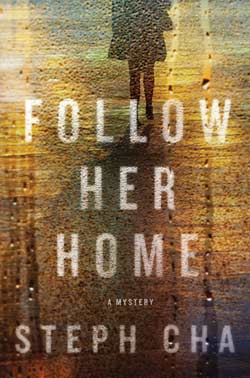 Follow Her Home by Steph Cha is a debut novel in which a young amateur sleuth finds that the streets of L.A. haven’t changed much since her hero Philip Marlowe was walking them (available April 16, 2013).
Follow Her Home by Steph Cha is a debut novel in which a young amateur sleuth finds that the streets of L.A. haven’t changed much since her hero Philip Marlowe was walking them (available April 16, 2013).
In the debut novel from Steph Cha, Juniper Song—just Song to her friends—is on her way to her friend Luke’s party. It’s Friday night and she plans to wake up hung over. Instead, she wakes up on a bench with a dead guy in her trunk.
Here’s the issue: Luke’s a little worried about his dad maybe cheating with Lori, a pretty young Korean-American girl from dad’s law office. And Song’s always has a fascination with old Raymond Chandler novels and would like to fancy herself a modern-day Philip Marlowe (minus the job and dames and gun), so he thinks she’d be perfect for poking her nose into his father’s love life. It sounds innocent enough. Take drunken Lori home, ask a few questions about her fancy new purse, maybe follow her a bit. Eh, not so much.
Song might not be Marlowe, but she finds herself in the middle of a horrid mess on the streets of L.A. just like her fictional role model. And like Marlowe, she finds some secrets aren’t so easily uncovered.
I tried to stall. “Who is that in my trunk?”
“That’s none of your concern, Miss Song.”
“Did you kill him?”
“Tsk-tsk.”
I looked at the ground and perked up at the sound of a door opening. A girl around my age came through it, a neighbor going to her car. It was a brief window, but it was there and it had a witness.
“I won’t go with you,” I said with volume, and I took my car key out of my purse. I stepped quickly to my car door and unlocked it.
Suddenly there was a navy-clad forearm in my field of vision and a pressure on my shoulder and at the side of my neck. I felt the warmth of a live human body all along my back. It was the negative of an embrace, the same gesture in a world of black teeth and white eyes.
His mouth at my ear let out hot breath and as he whispered I saw like a bat the quivering damp of his inner cheeks, red and uneven. “I can kill you, you know. You and your pathetic scrap of a family.”
Family is the reason Song has any experience detecting at all, and woven in with the present-day plot is the reminiscence of her discovering the secret her younger sister once kept and the painful memories attached to it.
Iris was the first subject of my surveillance. In the weeks following our confrontation, I spied on her in an attempt to solve the mystery that had torpedoed into our lives. It was a loose surveillance—Iris only left the house a few times, and when she did, I was not so bold as to follow her. The thought occurred to me, of course, and if I could have gotten away with it, I have no doubt I would have attempted it.
Instead, I took every chance I had to pick up any clues she left in our home. I rifled through her desk, her backpack, and all her drawers. I hoped to find a diary, or love letters, something solid and incriminating that would give me the answers I needed. Once, she forgot her cell phone at home, and I spent over an hour culling through her texts and contacts.
Which is what makes Song a decent modern day amateur sleuth—she’s nosy and she’s perfectly willing to go through drawers and follow people. Of course, she also has no trouble employing methods Marlowe couldn’t, like Facebook status updates and Google searches, that lead her on a twisty chase through the streets of L.A., from fancy cake to a K-town hostess club.
She quickly finds herself in way over her head and running out of people to ask for help. Make no mistake, though, Song is an amateur and people die “off camera,” but it’s not exactly a cozy. In fact, it probably has more in common with noir, especially the ending, if you’re the sort who worries about such things.
If not, Song is an interesting character, but she walls off a lot of herself, even as she’s telling her own story. Her independence and rough edges contrast well with damsel-in-distress Lori, who is innocent to the point of naïveté, sweeter than the specialty cake Song buys while following her, and seemingly unaware of the trouble her presence creates. Song is quick to point out that she doesn’t blame Lori—and she doesn’t think anyone else should either. If anything, she wants to save her, which might not make her any less “macho” than Marlowe or the people she chastises.
For more information, or to buy a copy, visit:
See more coverage of new releases with our Fresh Meat series.
Neliza Drew is a tofu-eating teacher and erratic reader with a soft spot for crime fiction. She lives in the heat and humidity of southern Florida with three cats and her adorable hubby. She listens to way too much music, writes often, and spends too much time on Twitter (@nelizadrew).
Read all posts by Neliza Drew on Criminal Element.
